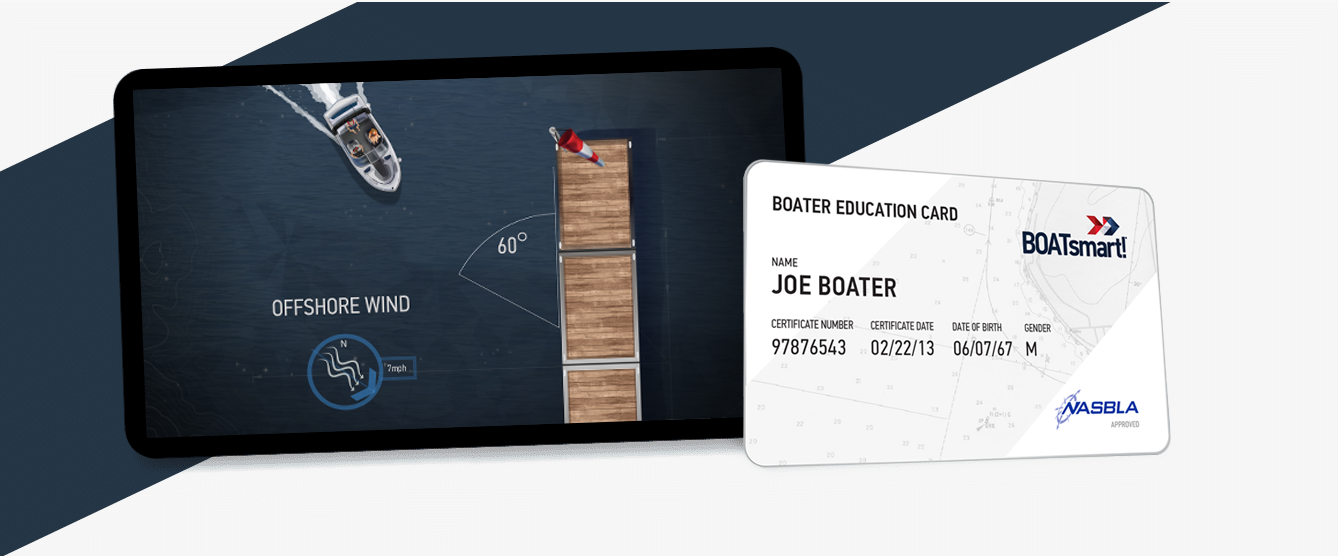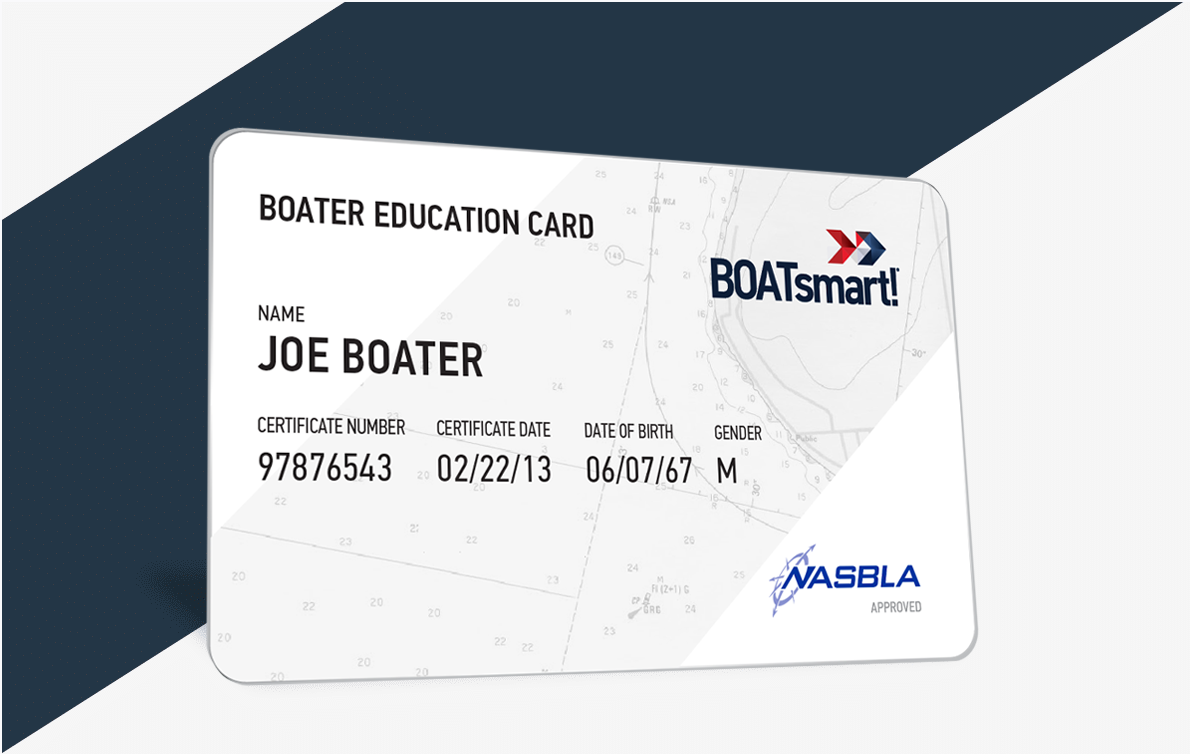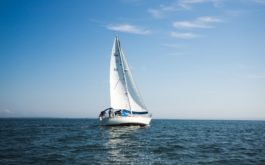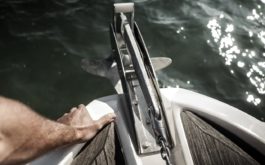Who needs a boater education ID card in Illinois?
No person born on or after January 1, 1998, unless exempted by subsection (i), shall operate a motorboat with over 10 horse power unless that person has a valid Boating Safety Certificate issued by the Department of Natural Resources or an entity or organization recognized and approved by the Department.
Persons at least 12 years of age and less than 18 years of age may only operate a motorboat if:
- They have in possession a valid Boating Education Certificate of Competency issued by the Illinois Department of Natural Resources, Safety Education Division, or
- They are accompanied on the motorboat and under direct control of a parent of guardian, or a person at least 18 years of age designated by a parent or guardian.
No person under 10 years of age may operate a motorboat.


Get your Official North American
Boating License
The Official NASBLA and State-Approved Boating Course, Test & License.
Get your Official North American
Boating License
The Official NASBLA and State-Approved Canada Boating
Course, Test & License.
ILLINOIS LIFE JACKET REQUIREMENTS
Illinois law requires that PFDs – life jackets or life vests – be available for each person aboard a boat or other watercraft. State law also requires that anyone under the age of 13 must wear a life jacket while aboard any watercraft under 26 feet in length at all times the boat is underway, unless they are below deck in an enclosed cabin or operating on private property. Illinois law also requires persons of any age to wear a PFD while operating a personal watercraft or Jet Ski.
BOAT REGISTRATION REQUIREMENTS IN ILLINOIS
If you want to operate a boat on Illinois’ waters, you may need to register and title your vessel with the IL Department of Natural Resources (DNR).
Continue reading for complete details about the boat registration and titling process, as well as the qualifications needed to operate a vessel in The Prairie State.
All vessels used on Illinois state waters must be titled and registered, with the following exceptions:
- Boats currently licensed in another state OR by the U.S. Coast Guard being used in Illinois for no longer than 60 consecutive days.
- Vessels registered in another country, temporarily being operated on Illinois waters.
- Boats owned by an entity of the United States government.
- Lifeboats used exclusively for that purpose.
- Boats competing in and designed for races approved by the Department of Natural Resources.
- Non-powered watercraft, such as:
- Canoes.
- Kayaks.
- Kiteboards.
- Paddle boards.
- Any other vessels not propelled by a sail or motor.
BOATING AND ALCOHOL
Boating and alcohol laws vary from state to state. In Illinois is is illegal to operate any boat, or manipulate any waterski, surfboard, or similar device while under the influence of alcohol or drugs. It is illegal for the owner of any boat to knowingly allow the boat to be operated by a person who is intoxicated or under the influence of any narcotic drug, barbiturate, or marijuana.
In Illinois, a person is considered to be under the influence if:
- They have a Blood Alcohol Concentration (BAC) level of 0.08 or higher.
- They are under the influence of any other drug or combination of drugs to a degree which renders such person incapable of safely operating any watercraft.
- They are under the influence of any intoxicating compound or combination of intoxicating compounds to a degree that renders the person incapable of safely operating any watercraft.
- There is any amount of a drug, substance, or compound in the person’s blood or urine resulting from the unlawful use or consumption of cannabis, a controlled substance, or an intoxicating compound.
Penalties
In Illinois, a person convicted of operating a boat while under the influence of alcohol will be subject to the following penalties:
- Upon a first conviction: A fine of up to $2,500 and/or imprisonment for up to 1 year.
- A second or subsequent conviction can result in more severe fines and penalties.
If an operator with a previous conviction injures a person, or operates a boat while under the influence while their operator privileges are suspended, they may be charged with a class 4 felony.
If the operator causes the death of another person, they can be charged with a class 2 felony.
Any person operating a boat on Illinois waters is deemed to have given consent to a chemical test or tests of their blood, breath, urine, or other bodily substance for the purpose of determining the alcoholic content of their blood and the presence of an abused substance or controlled dangerous substance. Refusal to submit to testing will result in the loss of boat operating privileges for a period of 2 years.
Illinois Law Enforcement
Illinois’ boating laws are enforced by:
- Officers of the Illinois Department of Natural Resources.
- Conservation Police Officers.
- Sheriffs, deputy sheriffs and other police officers.
Law enforcement have the authority to stop and board boats to ensure that they are in compliance with state and federal laws. It is illegal to refuse to follow the directions given by law enforcement authority. An operator who has received a visual or audible signal from a law enforcement officer must bring his or her boat to a stop.
You must yield and operate at a ‘Slow – No Wake’ speed when being approached by or when passing an emergency boat using its visual signals. Failure to comply will result in the suspension of boat operating privileges for a period of 3 months for up to 2 years.
CARELESS AND RECKLESS BOAT OPERATION
Reckless boat operation:
It is illegal in the state of Illinois to operate any boat or manipulate any waterskis, aquaplane or similar device in a careless, reckless or negligent manner so as to endanger the life, limb or property of any person.
Examples of reckless boat operation may include:
- Operating in a swimming area.
- Weaving through congested traffic.
- Jumping the wake of another boat unreasonably close to the other boat.
- Waiting until the last possible moment to swerve to avoid a collision.
- Creating a hazardous wake.
- Allowing passengers to ride on the bow, seat-back, gunwale or transom of a boat.
- Overloading a boat beyond the safe carrying capacity.
Note: Any person who by the operation of any boat in a careless, reckless, or negligent manner shall cause the death of another, shall be guilty of the crime of negligent homicide
Speed Restrictions
It is illegal to operate at speeds which do not allow the boat operator to bring the boat to a stop within the assured clear distance ahead.
It is illegal to operate in a restricted zones or ‘No Wake’ area that has been marked by buoys or signs such as a fishing or swimming areas. In areas designated as ‘No Wake’ areas, no motorized boat shall exceed a speed of 5 miles per hour (mph) while in the posted ‘No Wake’ area.
Additionally, no person shall operate a boat within 150 feet of a public launching ramp owned, operated or maintained by the Department or a political subdivision of the state at greater than ‘No Wake’ speed. Posting of the areas is not required.
Note: Any person who by the operation of any boat at an immoderate rate of speed shall cause the death of another, shall be guilty of the crime of negligent homicide.
ILLINOIS BOAT ACCIDENT REPORTING REQUIREMENTS
An operator involved in a boat accident is required to:
- Stop their boat at the scene.
- Render assistance to any person who has been injured or who is in danger so long as they can do so without risking their safety or their passenger’s safety.
- Provide their name, address and boat information in writing to any person who was injured, and to the owner of any property that was damaged as a result of the accident.
Note: Any person who has failed to stop or comply with this section must as soon as possible but no later than 1 hour after the collision or accident occurred, report the incident to the nearest police station or sheriff’s office.
A boat accident report must be completed by the operator and filed with the IDNR if:
- A person is killed or injured (must be reported within 48 hours).
- A person has disappeared or has been injured (must be reported within 5 days).
- There is complete loss of the boat (must be reported within 5 days).
- There is property damage that exceeds $2,000 (must be reported within 5 days).
Contact your local Illinois State Police District Dispatch Center for assistance in contacting a Conservation Police Officer to report a boating accident.
Failure to comply when the accident or collision resulted in the death or personal injury to a person is a Class A misdemeanor.
ILLINOIS DEPARTMENT OF NATURAL RESOURCES CONTACT INFORMATION
For more information about safe boating in Illinois, contact the Department at:
Illinois Department of Natural Resources
One Natural Resources Way
Springfield, IL 62702-1271
217-782-6302









